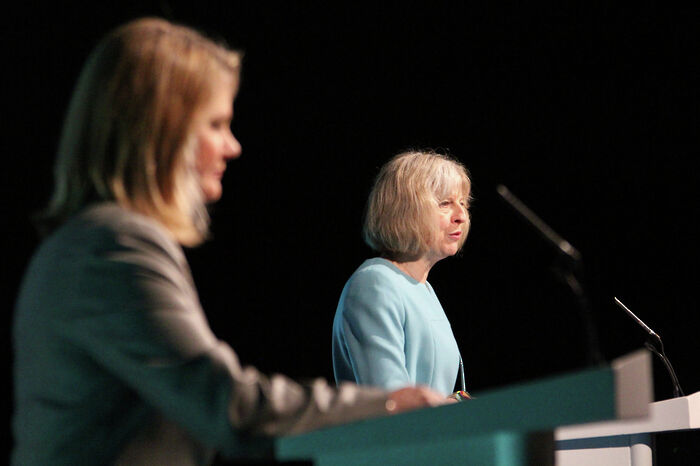Labour’s uncertain position on Brexit isn’t changing any time soon
In his third column, Tom Nixon discusses the causes and implications of the Labour Party’s nebulous stance on Brexit negotiations.

While the Conservative position on Brexit has never been crystal clear (see Theresa May’s “red, white and blue Brexit”), Labour’s is even more difficult to fathom. This was made particularly clear at the recent Labour Party conference, where Brexit was not even on the list of discussion points.
This leaves Remain voters in a difficult position, as the Labour Party seems to provide no viable alternative to the Conservatives' hard Brexit mantra. Labour is walking this political tightrope because of the fear of losing traditional voters and because of the views of their leader, Jeremy Corbyn.
For a party in which support for the Leave campaign amongst MPs was very low, enthusiasm for policies that limit the potential damaging effects of Brexit, such as staying within the single market, is very muted. At the Party Conference in September, a senior Labour source explained to the Daily Mirror that “jobs and the economy come first".
“The party is content not to lay out a firm position on Brexit to preserve party unity and its chances of electoral success”
No further clarification has been offered and in the first debate of the year at the Cambridge Union, Mark Hendrick, Labour MP for Preston, could only promise “access to the single market" when pushed on Labour’s Brexit position. This position seems contradictory because Labour would also seek to reduce immigration, and access to the single market implies following the same rules on freedom of movement.
To understand why this line has been taken you only need look at the countrywide pattern of Remain and Leave support. While the London Labour constituencies largely sided with Remain, in northern constituencies there were some of the strongest votes to leave the EU. The Labour Party is in a difficult position because it cannot be seen to alienate the metropolitan and younger voters by supporting an anti-immigration, hard-line Brexit.
But neither can it be seen to alienate the more traditional base of older, working class voters who supported a hard Brexit. This dangerous balancing act has meant that whenever a Labour MP is interviewed on the particulars of a Labour Brexit, all we get is evasive answers and awkward shuffling.
However, it is not just electoral concerns that have resulted in this balancing act. It is also worth looking at Jeremy Corbyn’s personal views on the EU. His appearances on behalf of the Remain campaign during the run-up to the Brexit referendum were lukewarm at best.
In April, leaks of internal emails even suggested that this ambivalence towards Brexit was a deliberate policy by him and his team. Sources indicated that the leader’s office was unwilling to fully support the campaign and to put Corbyn in a prominent role.
More recently, a BBC interview with Jeremy Corbyn on the first day of the Labour conference saw him downplay the benefits of single market membership. He commented on the difficulties of having EU restrictions on state aid as well as pressure to privatise sectors like rail. He also said that “a lot” of people would come from the EU to work in the UK, but did not comment specifically on free movement. These comments demonstrate that Corbyn has reservations about the benefits of the single market and this puts him at odds, yet again, with many of his MPs.
It is a demonstration of the power of Momentum, the pro-Corbyn grassroots support group, that it was able to ensure that there were no major discussions on Brexit throughout the Labour conference.
An email sent to members of the group advised them to vote for motions on topics like the NHS and social care at the exclusion of Brexit. They explained that these were “crucial issues the public care about”, despite the fact that Brexit is likely to be the most significant political issue for generations.
It is clear that divisions within Labour, both in the parliamentary party and amongst its voters, are as raw as ever. For now the party is content not to lay out a firm position on Brexit, to preserve party unity and its chances of electoral success.
However, Brexit is likely to remain a contentious issue for the foreseeable future, and Corbyn cannot evade its core issues forever. The Labour Party’s challenge is to create a Brexit policy that reconciles both the views of its traditional voting base and its new-found youth vote. It may not be able to keep both
 News / Uni partners with controversial Hong Kong university2 April 2025
News / Uni partners with controversial Hong Kong university2 April 2025 Comment / More Cambridge students should study abroad 1 April 2025
Comment / More Cambridge students should study abroad 1 April 2025 News / Hundreds of jobs to be cut at Cambridge University Hospitals1 April 2025
News / Hundreds of jobs to be cut at Cambridge University Hospitals1 April 2025 Lifestyle / A Goodchild’s Cambridge Confessional: Volume 23 April 2025
Lifestyle / A Goodchild’s Cambridge Confessional: Volume 23 April 2025 News / Caius clock hand returned nearly 100 years after student prank31 March 2025
News / Caius clock hand returned nearly 100 years after student prank31 March 2025



